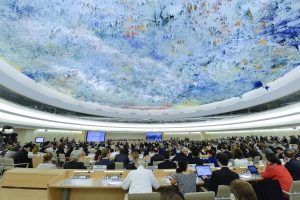
Oral Statement to the 36th Session of the Human Rights Council
- News
- 18 Sep 2017
The Death Penalty Project’s oral statement, delivered to the 36th Session of the Human Rights Council on 18th September 2017:
Mr. President,
We would like to thank the Secretary General on his yearly supplement to the quinquennial report on capital punishment, which emphasises the need for equal protection of the law, especially for individuals who are vulnerable by reason of their low economic status, mental or intellectual disability or by virtue of being a foreign national.
The Death Penalty Project provides free legal representation to those facing the death penalty, with a particular focus on the Commonwealth. While the global decline in the use of the death penalty in recent years should be celebrated, we are concerned that a disproportionate number of Commonwealth countries continue to impose death sentences and execute prisoners. On a global scale, approximately 25% of countries continue to retain the death penalty. However, a different picture is evident in the Commonwealth, where the figure stands at around 40%.
While there has been little political movement towards abolition in the Commonwealth, in many countries the courts have proven active in reforming the use of the death penalty, in accordance with international human rights principles. For instance, there is a growing international consensus that the mandatory death penalty, where death sentences are imposed automatically for certain offences, is cruel and inhuman and amounts to an arbitrary deprivation of life.
We are deeply concerned that this outdated practice, which leaves domestic courts with no discretion to consider the individual circumstances of the case, remains in force in a number of Commonwealth countries, including Malaysia, Nigeria, Ghana, Kenya, Trinidad and Tobago and Barbados. We urge the Council and its member states to call for the universal abolition of the mandatory death penalty, and for all states to ensure judicial discretion in all capital cases, pending the abolition of capital punishment.
Thank you Mr. President.
Photo credit: UN Photo/Jean-Marc Ferré (Flickr/Creative Commons), https://creativecommons.org/licenses/by-nc-nd/2.0/legalcode

















